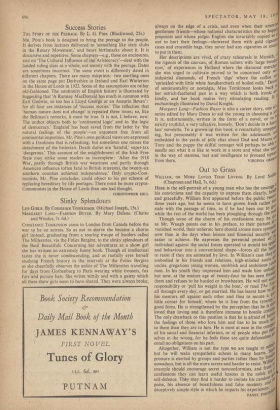Success Stories
THE STORY OF THE PEERAGE. By L. G. Pine. (Blackwood, 25S.) MR. PINE'S book is designed to bring the peerage to the people. It derives from lectures delivered to 'something like sixty clubs in the Rotary Movement,' and bears birthmarks about it. It is discursive and repetitive. Some chapters—e.g., those on enclosures, and on 'The Cultural Influence of the Aristocracy'—deal with the landed ruling class as a whole, not merely with the peerage. Dates are sometimes incorrect. The same event is differently dated in different chapters. There are many. misprints : two startling ones on the same page put Derbyshire in Ireland and Earl Winterton in the House of Lords in 1922. Some of the assumptions are rather old-fashioned. The continuity of English history is illustrated by Suggesting that 'A Ramsay MacDonald has much in common with Earl Godwin, so too has a Lloyd George or an Aneurin Bevan' : for all four are instances of 'success stories.' The reflection that 'human nature does not change' is repeated three times; so, like the Bellman's remarks, it must be true. It is not, I believe, new. The author objects both to 'continental logic' and to 'the logic of democracy.' England has been saved from the latter by 'the natural feelings of the people'—an argument free from all ' continental impurities. Mr. Pine's own political views are expressed with a frankness that is refreshing; but sometimes one misses the detachment of the historian. Death duties are 'hateful,' super-tax 'dangerous.' This account of the establishment of the Irish Free State may strike some readers as incomplete : 'After the 1918 War, partly through British war weariness and partly through American influence (often fatal to British interests), the twenty-six southern counties achieved independence.' Only crypto-Com- munists, Mr. Pine concludes, could object to his pet scheme of replacing hereditary by life peerages. There must be more crypto- Communists in the House of Lords than one had thought.
CHRISTOPHER HILL


































 Previous page
Previous page